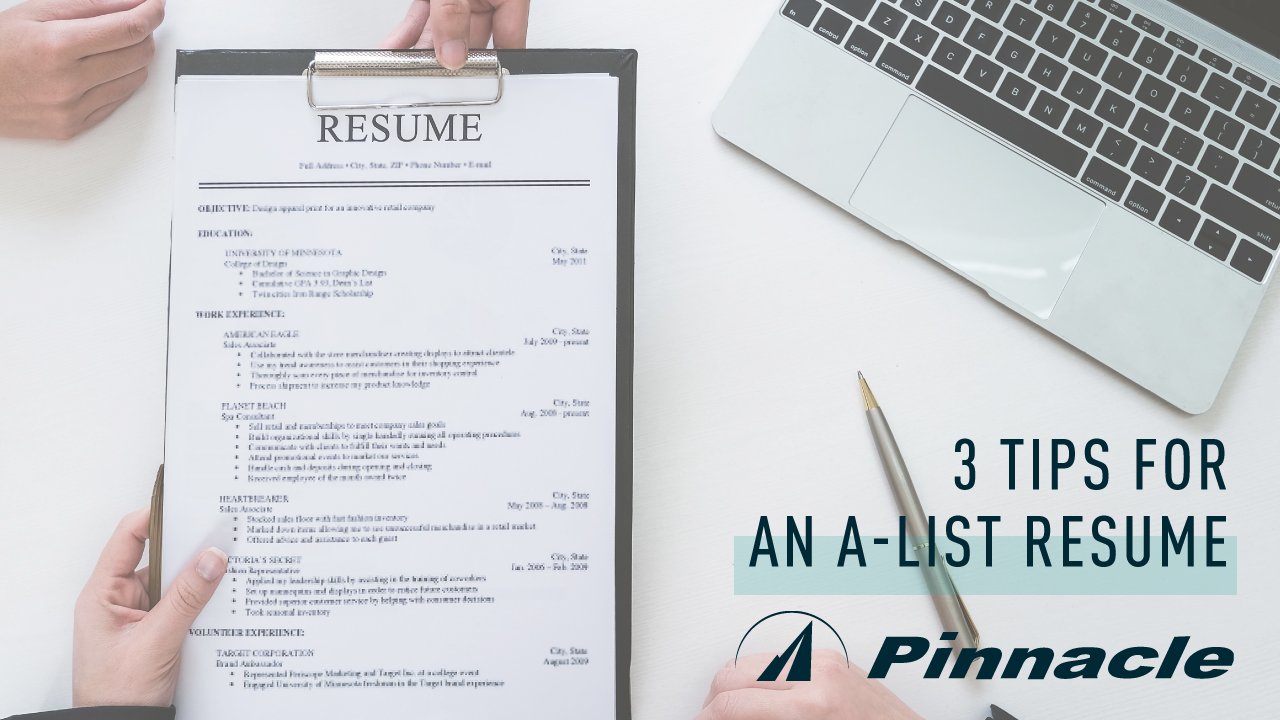
3 Tips for an A-List Resume
Updating your resume is one of those tasks that is often and easily pushed off until tomorrow, and tomorrow, and tomorrow. This is understandable: it’s not so much a task as it is a project that typically needs several rounds of edits. Now that we’ve all found ourselves with extra time at home, putting some effort toward updating your resume is a great way to remain proactive in the changing market. Though they may seem to some to be overvalued, resumes still remain an incredibly important part of the hiring process. While it’s not the only factor when it comes to hiring, employers lean on resumes to learn more about applicants and consider if they’d be a good fit, often before an applicant is ever allowed to introduce themselves in person. Below are our tips for an A-list resume to land you an interview.
1. Keep It to Two Pages
The two–or more–page resume is always a topic of debate. While the need to keep your resume to a single page is the stuff of myth, the bottom line is that your resume should remain concise. Limiting yourself to two pages is a recommended approach when structuring your resume.
Even if you have extensive and relevant credentials, experience, or training, there are ways to simplify and condense your story. Keep your resume simple, make use of bullet points, and focus on any collective or individual achievements earned during your time holding the position rather than simply describing the position itself. Many applicants can fill the basic parameters of a job description; it is important to show what you did with the opportunity in order to best separate your application from those of other candidates.
2. Look for Keywords
If your resume is already in pretty good standing shape, you can bring it to the next level by finding keywords in the job descriptions that interest you. Throughout your job search, study each description and find keywords that uncover what the employer is looking for in a candidate. Find and incorporate all keywords that apply to your experience and skill set into your resume and uniquely update according to each specific job application.
Look at the sections labeled “Requirements” or “Qualifications.” If you have the skills that employers are looking for, you can add these terms to your resume in the experience or skills sections. For example, if you’re applying for a Senior Audit Associate position, an employer will likely include keywords such as “managing”, “tight deadlines”, or “CPA licensure” in the description. In detailing how your past position or positions have included this type of relevant experience, you will more readily set yourself apart as a positional match.
3. Find Achievements
As touched on earlier, hiring managers and recruiters value candidates that will help them find and fix problems or provide solutions. You can be their solution to their problems if you list how you solved similar problems in the past.
Ask yourself: How did your accomplishments help the company? These accomplishments should make you stand out, not just a list of your duties. By listing your accomplishments, your resume will avoid the pitfall of appearing generic by providing a more relevant context.
Send in Your Resume, Consider Pinnacle
Writing a better resume will help you attract companies, but working with an experienced recruiter can boost your likelihood of landing that desired position, every step of the way. At Pinnacle Accounting & Finance, our team of experienced recruiters efficiently match qualified candidates with our client companies throughout the Pittsburgh market. If you would like to learn more, please contact us at 412-343-6300, email admin@paf-resources.com, or visit our website at paf-resources.com.
